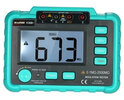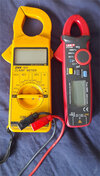Hi
Hoping someone has an idea of what is causing my RCD to trip before I have to get an electrician out.
If I have my kitchen sockets on they work fine and the RCD doesn't trip but if the MCB for the kitchen sockets is on and the boiler fires up the RCD protecting the kitchen MCB trips out, the boiler will keep working as it's on a seperate MCB and RCD.
With the kitchen MCB turned off the boiler fires up and the RCD doesn't trip out
Confused as to how something on a seperate circuit is causing the RCD to trip when the boiler fires up.
Anybody have an idea why??
Hoping someone has an idea of what is causing my RCD to trip before I have to get an electrician out.
If I have my kitchen sockets on they work fine and the RCD doesn't trip but if the MCB for the kitchen sockets is on and the boiler fires up the RCD protecting the kitchen MCB trips out, the boiler will keep working as it's on a seperate MCB and RCD.
With the kitchen MCB turned off the boiler fires up and the RCD doesn't trip out
Confused as to how something on a seperate circuit is causing the RCD to trip when the boiler fires up.
Anybody have an idea why??



